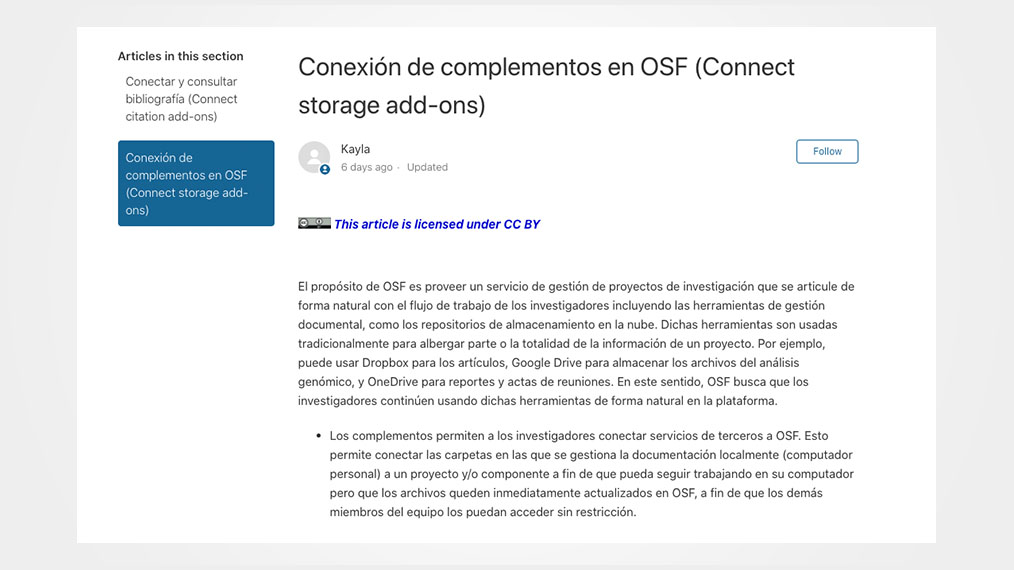
Science will not meet its potential until the research culture enables and supports contributors from all backgrounds and circumstances and contributions of all kinds based on the interests, skills, and resources available. Failure to achieve diversity, equity, and inclusion of all stakeholders in science will slow progress in discovery and translation of knowledge to solving humanity’s most pressing problems. Global communities of practice need infrastructure solutions to enable the workflows not bound by geographic location, socioeconomic factors, or language, which reduce the barriers to entry, collaboration, and discovery for research outputs throughout the lifecycle.
As a service built for the global research community, OSF was upgraded in 2017 to the Ember framework to provide the infrastructure for internationalization of OSF pages. This OSF upgrade means that pages can now be translated into a user’s preferred language. Likewise, the OSF support materials found in the help guides can also be shared in all languages to foster the global adoption of rigorous and transparent research practices using OSF.
COS is partnering with open science community language experts to create localized content and enable inclusivity. Most recently, we’re thrilled to announce a collaboration with Programa GAT (Generación de Alternativas Terapéuticas en Cáncer a partir de Plantas) to offer OSF help documentation and tutorials in Spanish!
Programa GAT is a publicly funded translational research programme, encompassing Colombian as well as international universities, research centers, and pharmaceuticals. The aim of the program is to develop a platform for discovering, analyzing, and transferring potential new treatments for cancer out of plants that are typically well suited for production in Colombia. The program is spearheaded by Pontificia Universidad Javeriana in Bogotá, Colombia and comprises an ecosystem of over 12 universities, together with other institutions and organizations working on best agricultural practices, bioprospection, chemical analysis, and clinical trials.
“While the program involves a world-class ecosystem of researchers and our research outputs are shared with the scientific English-speaking community, it is also the case that we include a wider array of institutions and are keen in transferring knowledge to local communities and students (starting with early STEM-oriented K-12 activities). This, together with our intent to share knowledge in an open collaborative philosophy, motivated us to generate tutorials and training materials for OSF within the context of our program, but intended for a general Spanish-speaking audience,” said Rafael Gonzalez, Profesor Titular, Pontificia Universidad Javeriana.
“This contribution is invaluable in demonstrating community engagement in open science as a way to encourage more adoption of best practices through resources to increase capacity and build communities of practice. We sincerely appreciate this partnership, and desire more just like it to support inclusion of the open science community through translated resources in every language one day,” said Nici Pfeiffer, Director of Product, Center for Open Science.
OSF was launched in the US, but it's a free public tool designed to be inclusively developed to best serve the global research community, and all language speakers. If you are a research community member interested in translating OSF Help resources, we’d love to speak with you. Please email support@osf.io to get in touch.

6218 Georgia Avenue NW, Suite #1, Unit 3189
Washington, DC 20011
Email: contact@cos.io

Unless otherwise noted, this site is licensed under a Creative Commons Attribution 4.0 International (CC BY 4.0) License.
Responsible stewards of your support
COS has earned top recognition from Charity Navigator and Candid (formerly GuideStar) for our financial transparency and accountability to our mission. COS and the OSF were also awarded SOC2 accreditation in 2023 after an independent assessment of our security and procedures by the American Institute of CPAs (AICPA).
We invite all of our sponsors, partners, and members of the community to learn more about how our organization operates, our impact, our financial performance, and our nonprofit status.